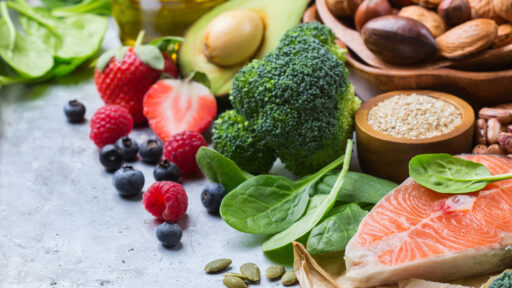Grocery shopping on a budget can be a daunting task, especially when prices for healthy and trendy foods are skyrocketing. However, you don’t have to sacrifice your health or your wallet to enjoy a nutritious meal. Here’s a list of 50 affordable and healthy grocery store finds to make your shopping experience easier.
We will provide you with a comprehensive list of healthy ingredients that won’t break the bank, as well as some general shopping tips to help you navigate the supermarket. Whether you’re looking to save money or simply want to make healthier choices, this guide has got you covered.
Where to start?
Creating a healthy and budget-friendly grocery list requires a combination of balanced eating and meal planning. Balanced eating means consuming a variety of macronutrients and micronutrients for optimal health. The plate method is a great way to visualize this, with one-quarter of the plate filled with whole grains, one-quarter with healthy protein, and half with fruits and vegetables. The Harvard Healthy Eating Plate is a useful reference for this.
To start meal planning, take inventory of what you already have in your kitchen and plan meals and snacks for the week. Utilize leftover ingredients from earlier recipes to save money. For example, leftover roasted chicken and veggies from Monday’s dinner can be used to make quesadillas on Wednesday. This step is crucial to avoid overspending on unnecessary foods.
Once you have your meal plan, create a grocery list with specific amounts of ingredients needed to avoid over-purchasing. Here are some tips for making a healthy, affordable grocery list:
- Choose seasonal produce, as it is often cheaper and fresher.
- Opt for frozen fruits and vegetables when fresh options are not available.
- Buy in bulk for pantry staples like rice, beans, and oats.
- Look for sales and coupons on healthy options like whole grains, lean protein, and produce.
- Consider store-brand options, as they are often cheaper than name-brand products.
By following these tips and utilizing balanced eating and meal planning, you can create a healthy and affordable grocery list.
Your Go-To Cheap, Healthy Grocery List
When on a budget, it can be challenging to find healthy options at the grocery store. Here’s a shopping list that won’t break the bank and will keep you on track with your health goals.
Staples
- Brown rice
- Whole wheat pasta
- Canned beans (black, kidney, chickpeas)
- Canned tomatoes
- Frozen vegetables (broccoli, cauliflower, spinach)
- Eggs
- Plain Greek yogurt
- Whole wheat bread
Fruits and Vegetables
- Apples
- Bananas
- Carrots
- Cucumbers
- Sweet potatoes
- Onions
- Garlic
Proteins
- Chicken breast
- Ground turkey
- Canned tuna
- Tofu
Snacks
- Popcorn kernels
- Nuts (almonds, walnuts)
- Rice cakes
- Hummus
- Dark chocolate (70% or higher)
With these items, you can create a variety of meals and snacks that are both healthy and budget-friendly. Remember to check for sales and coupons to save even more money.
Fruit and Veggies
When it comes to buying produce, it’s important to find options that are both nutritious and affordable. Luckily, there are many fruits and vegetables that fit the bill. Here are some top picks for produce that won’t break the bank:
Bananas
Bananas are a great choice for a budget-friendly fruit. Not only are they typically inexpensive, but they’re also packed with nutrients like fiber, potassium, magnesium, and vitamin B6. These nutrients can help support gut, heart, and sleep health. Bananas can be enjoyed on their own as a snack, or added to smoothies, oatmeal, chia pudding, or pancakes for a nutritious breakfast.
Cabbage
Cabbage is another affordable produce option that offers a lot of nutritional value. This veggie is rich in vitamin K, vitamin C, and fiber, which can help support healthy blood clotting, immune health, and digestive health. Cabbage can be added to soups, stews, salads, and stir fries for an easy and nutritious boost.
Apples
Apples are a family favorite that are often on sale at the grocery store. They’re high in fiber, which can help you feel full and satisfied, as well as vitamin C and plant compounds that can help reduce inflammation and boost immunity. Apples make a great snack when paired with peanut butter, or they can be sliced and added to salads, oatmeal, smoothies, and baked goods.
Onions
Onions are not only affordable, but they also have a long shelf life when stored properly. They’re a good source of fiber, vitamin C, and folic acid, as well as modest amounts of iron and calcium, which can help support immune, gut, bone, and heart health. Onions are a versatile ingredient that can be used in many dishes, including pastas, soups, salads, casseroles, dips, and curries.
Broccoli
Broccoli is a member of the brassica vegetable family and is one of the least expensive options. It’s packed with nutrients like fiber, vitamin B6, vitamin C, vitamin A, vitamin K, folic acid, and plant compounds, which can help support eye, immune, heart, and metabolic health. Broccoli is delicious roasted with a sprinkle of salt, pepper, and lemon juice as a side, or added to egg recipes, rice dishes, pasta, soups, casseroles, and more.
Garlic
Garlic is another affordable option that can add flavor and nutrition to many dishes. It’s rich in bioactive plant compounds that can help reduce inflammation and fight off disease-causing free radicals. Garlic can be used in sauces, marinades, veggie side dishes, stews, pastas, dressings, and more.
Oranges
Oranges are a great source of fiber, vitamin C, vitamin A, and calcium, which can help boost immune, gut, eye, and bone health. They’re often reasonably priced, especially during the winter months when they’re in season. Oranges can be enjoyed as a snack or added to salads, sauces, marinades, and baked goods.
Zucchini
Zucchini is a summer squash that grows abundantly in the summer months, making it an affordable option. It’s rich in water, plant compounds, fiber, and vitamin C, which can benefit skin, immune, and digestive health. Zucchini can be grilled as a side, or added to pasta bakes, soups, casseroles, salads, and stir fries.
Cucumber
Cucumbers are usually reasonably priced year-round and are a refreshing and nutritious option. They’re rich in water, fiber, vitamin K, and vitamin C, which can help boost immune, digestive, and heart health. Cucumbers are great as crudités, or added to slaw, salad, or cold soup recipes.
Green Beans
Green beans are a versatile veggie that can be enjoyed raw in salads and slaws, or cooked in casseroles, pastas, soups, and more. They’re typically affordable and are a good source of fiber, folate, and vitamins A, C, and K, which can help support digestive, metabolic, eye, heart, and immune health.
Sweet Potatoes
Sweet potatoes are slightly more expensive than white potatoes, but they still offer impressive nutrition stats. They’re rich in fiber, vitamin C, vitamin A, and plant compounds, which can help support better gut, immune, and eye health. Sweet potatoes can be mashed or roasted for an easy side, stuffed with taco toppings for a quick dinner, or added to soups, casseroles, and grain bowls.
Melon
Melons like watermelon, cantaloupe, and honeydew are typically very reasonably priced. They’re excellent sources of fiber, water, and vitamin C, which can
Meat and Fish
When it comes to choosing meats, there are plenty of options available to you. Here are some of the best choices for your health and budget:
Farmed Salmon
Salmon is a delicious and nutritious fish that is packed with heart-healthy unsaturated fats, omega-3 fatty acids, and muscle-building protein. Farmed salmon is a great option, as many fish farms are able to control the fish’s environment to ensure fewer contaminants and pollutants in the final product. However, it’s important to buy salmon from a trusted retailer to ensure quality and safety. Salmon can be prepared in a variety of ways, including roasting, grilling, poaching, broiling, pan-frying, or baking.
Ground Turkey
Ground turkey is an affordable and healthy alternative to red meat. It’s packed with protein and B vitamins, which support tissue growth, repair, and development, as well as metabolism and immunity. Opt for lean varieties to reduce saturated fat and dietary cholesterol. Ground turkey can be used in a variety of dishes, such as tacos, sauces, pastas, casseroles, lettuce wraps, and salads.
Pork Loin
Pork loin is a lean and budget-friendly option for red meat. While pork tenderloin is the leanest, pork loin is still low in saturated fat and dietary cholesterol, especially if you trim off any visible fat before cooking. It’s also rich in protein and B vitamins for tissue and metabolic health. Pork loin can be rubbed with herbs and spices and roasted, grilled, or pan-fried.
Chicken Thighs
Chicken thighs are a nutritious and affordable option for poultry. While they are not the leanest cut, they are high in protein, B vitamins, and selenium to support metabolism, immunity, and tissue health. To reduce saturated fat and cholesterol, buy skinless thighs or remove the skin before cooking. Chicken thighs can be braised, grilled, or baked and added to pastas, soups, stir-fries, and salads.
Incorporating these meats into your diet can provide a variety of nutrients and flavors while also being budget-friendly. Remember to choose high-quality meats from trusted retailers and to prepare them in healthy ways to maximize their benefits.
From the Freezer
When it comes to saving money and time while still getting the health benefits of fruits, vegetables, and fish, frozen foods are a great option. Here are some of the best frozen foods you can buy:
- Frozen Berries: Frozen berries are a great option for smoothies and baking. They’re high in antioxidants, vitamin C, and fiber, which can help boost your immune and gut health. You can also add them to cold cereal, oatmeal, pancakes, waffles, and sauces.
- Frozen Spinach: Frozen spinach is a better buy than fresh spinach, especially when considering how much spinach cooks down. It’s high in iron, vitamin C, vitamin K, fiber, calcium, folic acid, and plant compounds that support immune, blood, heart, bone, and gut health. You can add it to soups, pastas, casseroles, smoothies, and savory pies.
- Frozen Mango: Frozen mango is significantly cheaper than fresh and lasts longer in the freezer. It’s high in vitamin A, vitamin C, fiber, potassium, and plant compounds that can aid in better immune, eye, heart, and gut health. You can add it to smoothies, sorbet, baked goods, and overnight oats.
- Frozen Cauliflower: Frozen cauliflower is a great way to save money on fresh cauliflower. It’s full of fiber, potassium, vitamin C, vitamin B6, magnesium, folate, and vitamin K, which can encourage gut, heart, immune, metabolic, and blood health. You can roast it as a side, or add it to rice dishes, pastas, and soups. You can even defrost it and rice it for a low-carb swap.
- Frozen Mixed Vegetables: The classic frozen veggie mix is an excellent grab for both cost savings and convenience. You’ll find plenty of fiber, protein, vitamin C, and plant compounds in this iconic blend to support tissue, gut, and immune health. You can use it in pot pie, fried rice, and vegetable noodle soup.
- Frozen Fish: If fresh fish is out of your budget, frozen fish may be a better alternative. You’ll find plenty of heart-healthy unsaturated fats, tissue-building protein, and B vitamins for healthy metabolism in your choice. You can add it to soups, stews, pastas, or bake it and drizzle it with lemon, salt, and pepper.
- Frozen Edamame: Frozen edamame is both inexpensive and readily available. It boosts gut, heart, and immune health with the fiber, vitamin K, folate, potassium, magnesium, and iron it contains. You can eat it as an easy snack, or add it to soups, stir fries, and rice dishes. Just be sure to shell it first.
In conclusion, frozen foods can be a great way to save money and time while still getting the health benefits of fruits, vegetables, and fish. With a little creativity, you can use these frozen foods in a variety of dishes to add flavor and nutrition to your meals.
From the Fridge
The refrigerated section of the grocery store is a great place to find affordable and nutritious options for your meals. Here are some options that won’t break the bank:
- Sauerkraut: This zippy fermented cabbage is rich in healthy bacteria, also known as probiotics, to support gut health. It can be used to top proteins and salads, or enjoyed right out of the jar as a quick snack.
- Tofu: This plant-based protein is rich in fiber and plant compounds to support healthy energy levels as well as gut and immune health. It can be baked, grilled, or sautéed to then be added to noodle dishes, soup, salad, or grain bowls.
- Miso Paste: This fermented soybean paste is full of rich umami flavor and is rich in manganese and probiotics for better gut and immune health. It adds unctuous flavor to sauces, marinades, soups, and more.
- Yogurt: This cheap but nutritious option is high in probiotics and offers protein and phosphorus for tissue and bone health. Opt for plain yogurt for cost savings and culinary flexibility.
- Eggs: This cheap source of protein is delicious in a myriad of breakfast dishes, as well as baked goods, fried rice, noodle dishes, and more. It is also rich in immune-boosting vitamin D and metabolism-supporting B vitamins.
- Butter: While it is higher in saturated fat and dietary cholesterol, recent research has found conflicting evidence around this claim. That said, given that there is other research finding these fats do not support heart health, we want to use butter sparingly (which increases its affordability).
- Milk: Whether you choose cow’s milk or an alternative, many milks on the market offer similar nutrition in this day and age of fortification – including protein, calcium, and vitamin E to support tissue, bone, and immune health.
- Cottage Cheese: This affordable cheese tends to be lower in saturated fat and dietary cholesterol, and it includes probiotics. This in combination with the protein, B vitamins, and calcium it contains helps to boost gut, tissue, metabolic, and bone health.
- Nitrate-Free Turkey Slices: These can be a convenient choice, saving you time and money. The nitrates found in processed meats can be harmful to our health so it’s best to buy a nitrate-free brand to yield all the benefits associated with turkey. These are delicious on salads, sandwiches, and in lettuce wraps.
Packaged Foods
When it comes to saving money on groceries, packaged foods can be a great way to stretch your dollar. However, not all packaged foods are created equal. Here are some affordable and nutritious packaged foods that you should consider adding to your pantry:
- Canned Tomatoes: Canned tomatoes are a versatile and healthy addition to any pantry. They are rich in fiber, vitamin A, and vitamin C, which can help to support gut and immune health. Use canned tomatoes to make a quick pasta sauce, soup, or casserole.
- Whole Grain Oats: Buying a big container of oats and making oatmeal at home is a great way to save money on breakfast. Oats are high in fiber, protein, and B vitamins, which can help to support healthy digestion, energy, and metabolism. They can be enjoyed as oatmeal, overnight oats, or in a variety of baked goods.
- Mustard: Mustard is an inexpensive and healthier alternative to many other condiments. It is low in saturated fat and cholesterol (although it can be high in sodium), and can be used to top sandwiches and burgers, or to make salad dressing, aioli, and marinades.
- Popcorn Kernels: Buying popcorn kernels and popping them at home is an easy way to save money on snacks. Popcorn is a great source of fiber, which can help to support digestive health.
- Dried Italian Seasoning: Italian seasoning is a great all-in-one dried seasoning blend that can be added to pastas, soups, casseroles, and even breads. It is loaded with anti-inflammatory plant compounds and can be a great value, as it combines many dried herbs that you may otherwise buy separately.
- Canned Tuna: Canned tuna is a great way to save money on protein. It is rich in omega-3 fatty acids, protein, and B vitamins, which can help to support immune, heart, and metabolic health. Canned tuna can be enjoyed in salads, sandwiches, casseroles, and even pastas.
- Dried Lentils: Dried lentils are an excellent source of fiber, protein, B vitamins, iron, and potassium, which can help to support gut, heart, and immune health. They are delicious in soups, stews, dal, and homemade veggie burgers (although they should be soaked and cooked first!).
- Whole Wheat Pasta: While white pasta is cheaper, whole wheat pasta is a more nutritious option. It is rich in fiber, protein, B vitamins, and plant compounds, which can help to support gut, tissue, and immune health. Pasta recipes can range from mac and cheese to pasta bakes, or even soup.
- Unsweetened Dried Cranberries: Dried fruit is a great value thanks to its long shelf life. Unsweetened dried cranberries are one of the most nutritious options, as they are rich in fiber, plant compounds, and vitamin C, which can help to support gut and immune health. They are perfect on their own as a snack, or added to baked goods and homemade trail mix.
- Whole Wheat Bread: Whole wheat bread is an affordable and nutritious option for sandwiches, croutons, meatballs, and French toast. It has a similar nutrition profile to whole wheat pasta and is a great source of fiber, protein, B vitamins, and plant compounds.
- Almonds: Almonds are a top-tier nut option when it comes to both price and nutrition. They are packed with protein, fiber, unsaturated fats, and vitamin E, which can help to support heart, metabolic, gut, and immune health. They can be snacked on alone, or added to salads, baked goods, oatmeal, trail mix, and breading for protein.
- Unsweetened Applesauce: If fresh apples aren’t available or aren’t on sale, unsweetened applesauce is a great alternative when looking to save money. It has the same nutrition profile as apples and can be enjoyed as is or added to baked goods, smoothies, oatmeal, and pancakes in the morning.
- Canned Peaches in Fruit Juice: Canned peaches are a great way to enjoy the fruit on a budget. They are full of fiber, vitamin A, and vitamin C, which can help to support gut and immune health. It’s important to choose peaches packed in fruit juice, as opposed to sugar syrup, to avoid the negative health impacts of added sugar. They are delicious as a snack, added to baked goods, or stirred into warm oatmeal.
- Brown Rice: Brown rice is a slightly more costly option compared to white rice, but it is worth it for the added nutrition it provides. It is rich in fiber, protein, B vitamins, selenium, manganese, and potassium, which can help to support gut, metabolic, heart,







